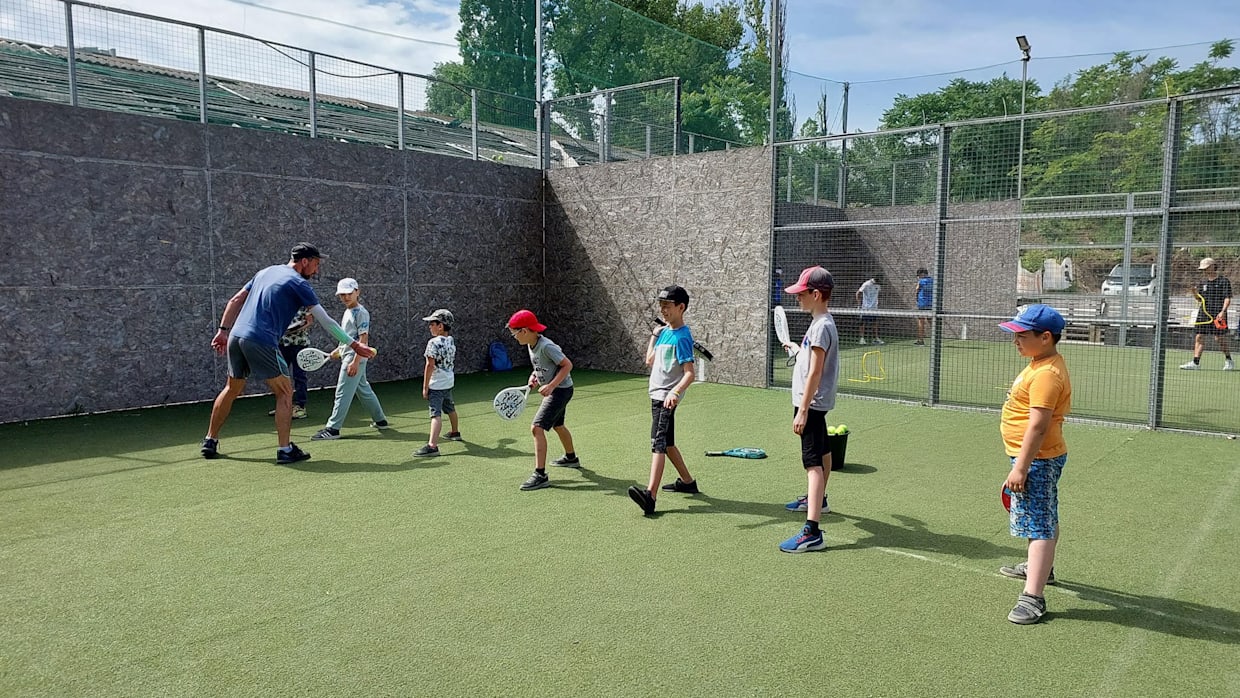Squash courts as safe havens: How Sport Coach+ supports coaches working with refugees
The International Olympic Committee (IOC) is dedicated to supporting refugees and populations affected by displacement. In 2017, the IOC established the Olympic Refuge Foundation (ORF) to strengthen this commitment and support the protection, development and empowerment of children and young people in vulnerable situations through sport. One notable initiative of the ORF is Sport Coach+, a programme carried out in collaboration with the International Federation of the Red Cross (IFRC) Psychosocial (PS) Reference Centre, which trains coaches in Ukraine and surrounding countries to better support young refugees’ mental well-being. A squash and padel club in Moldova exemplifies this mission, and a coach shares with us the support that the programme provided as their club opened its doors to Ukrainian refugees.

Sport as a safe space
Iulia Durlestean is a coach and the logistical coordinator of the Kangaroo Squash & Padel Club in Chișinău, Moldova, which has played a key role in creating a safe haven for refugees. With over 1.4 million Ukrainians crossing into Moldova since February 2022, and more than 120,000 remaining in the country as refugees, her club became a refuge, providing shelter and support for those in need.
Durlestean explains: “To help, we made a temporary refugee shelter by modifying our squash courts, putting down pallets, making beds and giving people access to showers and the kitchen. Many people were living in the club.”
Helping young people rediscover joy
Once families were settled, Durlestean and her club focused on helping children reconnect with joy through sport. They introduced games like pickleball and padel, which are easy to learn and encourage social interaction.
We just want them to be in a good mood and to start to enjoy themselves. Sport is a very helpful tool to help children work through stress. When we practise sport, we forget about the trauma, the sad news and even war for a while. Iulia Durlestean - Coach and the logistical coordinator of the Kangaroo Squash & Padel Club in Chișinău, Moldova
Recognising the need for professional support in her sport's changing landscape, Durlestean readily accepted the Moldovan Olympic Committee's invitation to participate in the Sport Coach+ pilot. “For me, it was a very big opportunity, not only because I want to help these people, but I want to help these people professionally,” said Durlestean. Observing the impact it has had on her knowledge and skills in coaching young people affected by displacement, she noted: “Sport Coach+ was like a university for me.”
At a Sport Coach+ training session in Bucharest, Romania, Durlestean learned techniques to address the psychological needs of young athletes. “I learned how important it is to give more time to the psychological side in our sport sessions,” she notes. The formula of “calm, connect, and coach” a trainer has become integral to her approach: “We need to be calm, share some exercises for relaxing, such as breathwork, and then we connect with our students.”
One story that stands out for Durlestean is that of Victoria and her 12-year-old daughter, Angelina. After a harrowing journey involving walking on foot to Moldova, Angelina, who was a squash player before being displaced, found solace in teaching squash to young children. Durlestean ensured she was supported by Maksym, another Ukrainian refugee and coach at the club. This connection and activity helped Angelina regain confidence and purpose, even as she and her mother plan to return home.
A call to action for coaches
As the war continues to impact lives, initiatives like Sport Coach+ play a vital role in helping displaced young people rebuild their futures through sport. This Olympic Refuge Foundation initiative, which is carried out in partnership with the IFRC PS Centre, together with Red Cross National Societies and National Olympic Committees, focuses on providing essential tools and skills to foster welcoming, inclusive and trauma-sensitive sports sessions for participants of all skill levels.
In addition to coaches and mental-health professionals working in contexts affected by displacement, Durlestean emphasises the transformative impact of Sport Coach+ for people, like herself, who have unexpectedly found themselves in coaching roles: “These people and children need these mental-health exercises and training to start their new lives,” she notes.
If you're a coach working with refugees, consider joining Sport Coach+. The initiative offers training to help create supportive environments for vulnerable young people, particularly those affected by displacement. To learn more, visit www.sportcoachplus.org.